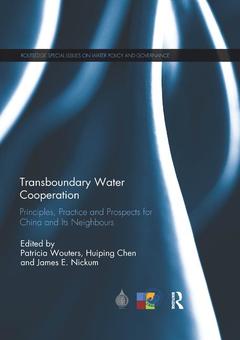Transboundary Water Cooperation Principles, Practice and Prospects for China and Its Neighbours Routledge Special Issues on Water Policy and Governance Series
Coordonnateurs : Wouters Patricia, Chen Huiping, Nickum James E.

China and its neighbours face a series of water security issues, in which international law plays a vital role. Paramount to both policymakers and researchers in the field of water law, the current status of transboundary water cooperation schemes and how these operate in China is of global significance.
Grounded in international experience, this comprehensive volume provides readers with an up-to-date overview of current international transboundary water resource sharing policies and practices, including detailed case studies at both domestic and international levels. The authors discuss existing international laws, treaties, and principles that may stimulate transboundary water cooperation and dialogue, and then analyse a number of international experiences with treaties in North America, Eastern Europe, and Central Asia. They take stock of China?s water resource issues, legal practices and options, examine case studies of China?s southern shared rivers, and explore some innovative approaches to cooperative management of shared waters within China.
The articles in this book were originally published in the journal Water International.
1. Introduction Part I: The building blocks of cooperation on shared waters 2. One step at a time: international law and the duty to cooperate in the management of shared water resources 3. The human right to water and foreign investment: friends or foes? 4. Ten building blocks for sustainable water governance: an integrated method to assess the governance of water 5. Transboundary water law and vulnerable people: legal interpretations of the ‘equitable use’ principle 6. The governance of wetland ecosystems and the promotion of transboundary water cooperation – opportunities presented by the Ramsar Convention Part II: International experiences 7. The UNECE Water Convention and the development of transboundary cooperation in the Chu-Talas, Kura, Drin and Dniester River basins 8. Do good fences make good neighbours? Canada-United States transboundary water governance, the Boundary Water Treaty, and twenty-first-century challenges 9. Transboundary water management: lessons learnt from North America 10. An analysis of Turkey’s water diplomacy and its evolving position vis-à-vis international water law Part III: China’s international waters and the potential for cooperation 11. Identifying China’s transboundary water risks and vulnerabilities – a multidisciplinary analysis using hydrological data and legal/institutional settings 12. Contemporary legal analysis of China’s transboundary water regimes: international law in practice 13. China’s practice on the non-navigational uses of transboundary waters: transforming diplomacy through rules of international law 14. Benefit-sharing and upstream/downstream cooperation for ecological protection of transboundary waters: opportunities for China as an upstream state 15. Approaches to investment in Chinese transboundary waters 16. Mapping Asia’s trans-boundary waters, with a focus on China Vivian Part IV: China’s southbound basins 17. China’s southbound transboundary river basins: a case of asymmetry 18. Water security in Himalayan Asia: first stirrings of regional cooperation? 19. Transboundary water cooperation on the Yarlung Zangbo/Brahmaputra –a legal analysis of riparian state practice 20. Benefit sharing in the Mekong River basin Part V: Innovative approaches to cooperation of China’s shared domestic waters 21. A new perspective on water governance in China: Captain of the River 22. Exploring China’s approach to implementing ‘eco-compensation’ schemes: the Lake Tai watershed as case study considered through a legal lens 23. Conclusion: Lessons and Observations
Patricia Wouters is a Professor in the School of Law at Xiamen University, China, and Director of the China International Water Law Programme (CIWL).
Huiping Chen is a Professor in the School of Law at Xiamen University, China.
James E. Nickum is an institutional economist affiliated to the IWRA, the Centre for Water and Development at SOAS, UK, and the University of Hong Kong.
Date de parution : 12-2019
17.4x24.6 cm
Date de parution : 11-2017
17.4x24.6 cm
Thèmes de Transboundary Water Cooperation :
Mots-clés :
Water International; Transboundary waters; China; water policy; water governance; water law; Transboundary Water; water resource; Transboundary Water Cooperation; environment; China's Transboundary Water; cooperation; International Water Law; water security; International Watercourses; shared waters with China; Watercourse States; Huiping Chen; UNECE Water Convention; James E; Nickum; Yarlung Zangbo; David Devlaeminck; Watercourses Convention; Lancang River; IWRM; Yarlung Zangbo River; United Nations Watercourses Convention; Great Lakes Water Quality Agreement; Mekong River Basin; UNECE Convention; Limited Territorial Sovereignty; Downstream Countries; Remedial Action Plans; Co-riparian States; Socio-economic Development; Riparian Countries; Irtysh Ob River; Transboundary Water Governance



